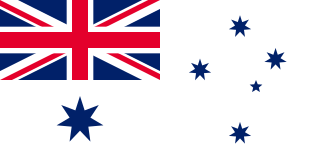Related Research Articles

The Royal Air Force (RAF) is the United Kingdom's aerial warfare and space force. It was formed towards the end of the First World War on 1 April 1918, becoming the first independent air force in the world, by regrouping the Royal Flying Corps (RFC) and the Royal Naval Air Service (RNAS). Following the Allied victory over the Central Powers in 1918, the RAF emerged as the largest air force in the world at the time. Since its formation, the RAF has taken a significant role in British military history. In particular, it played a large part in the Second World War where it fought its most famous campaign, the Battle of Britain.

The Royal Australian Navy (RAN) is the naval force of the Australian Defence Force (ADF). The professional head of the RAN is Chief of Navy (CN) Vice Admiral Mark Hammond AM, RAN. CN is also jointly responsible to the Minister of Defence (MINDEF) and the Chief of Defence Force (CDF). The Department of Defence as part of the Australian Public Service administers the ADF.

The Royal Australian Air Force (RAAF) is the principal air and space force of Australia, a part of the Australian Defence Force (ADF) along with the Royal Australian Navy and the Australian Army. Constitutionally, the Governor-General of Australia, is the de jure Commander-in-Chief of the Australian Defence Force. The Royal Australian Air Force is commanded by the Chief of Air Force (CAF), who is subordinate to the Chief of the Defence Force (CDF). The CAF is also directly responsible to the Minister for Defence, with the Department of Defence administering the ADF and the Air Force.

The Australian Defence Force (ADF) is the military organisation responsible for the defence of the Commonwealth of Australia and its national interests. It consists of the Royal Australian Navy (RAN), Australian Army, Royal Australian Air Force (RAAF) and several "tri-service" units. The ADF has a strength of just over 85,000 full-time personnel and active reservists and is supported by the Department of Defence and several other civilian agencies.

The Norwegian resistance to the occupation of Norway by Nazi Germany began after Operation Weserübung in 1940 and ended in 1945. It took several forms:

The Minister for Defence is the principal minister responsible for the organisation, implementation, and formulation of government policy in defence and military matters for the Australian Government. The individual who holds this office directs the government’s approach to such matters through the Australian Defence Organisation and, by extension, the Department of Defence and the Australian Defence Force. The office of the Minister for Defence, like all Cabinet positions, is not referenced in the Constitution of Australia but rather exists through convention and the prerogative of the Governor-General to appoint ministers of state.

David Pratt is a Canadian former politician. He was the Member of Parliament for Nepean—Carleton from 1997 until 2004.

Karl Rudolf Walden was a Finnish industrialist and a military leader.

Fortress Europe was a military propaganda term used by both sides of the Second World War which referred to the areas of Continental Europe occupied by Nazi Germany, as opposed to the United Kingdom across the Channel.

Major-General Ranjit Lal Jetley, FIE, FIQA was an Indian soldier and scientist. He served in World War II and the 1947 Indo-Pakistani War, becoming an artillery regiment commander. He went on to work in armaments research and development, his innovations including an Indian 10mm light field gun and upgunning of the Sherman tanks. He also contributed to set up two major laboratories. Jetley retired in 1979 and moved to the United Kingdom.

The Reserve Defence Forces (RDF) are the combined reserve components of the Irish Defence Forces. The RDF is organised into the First Line Reserve (FLR) and an active Second Line Reserve. The First Line Reserve comprises former members of the Permanent Defence Forces (PDF) and the Second Line Reserve comprises the Army Reserve (AR) and Naval Service Reserve (NSR).
Defence Australia is a department of the Government of Australia charged with the responsibility to defend Australia and its national interests. Along with the Australian Defence Force (ADF), it forms part of the Australian Defence Organisation (ADO) and is accountable to the Commonwealth Parliament, on behalf of the Australian people, for the efficiency and effectiveness with which it carries out the Government's defence policy.
The National Emergency Management Agency is the public service department of New Zealand responsible for providing leadership and support around national, local and regional emergencies. It is an autonomous departmental agency hosted by the Department of Prime Minister and Cabinet. It replaced the Ministry of Civil Defence and Emergency Management in December 2019.
A Defence Review is the process by which government of the United Kingdom decides upon its overall defence policy and upon the means and resources devoted to achieving its defence objectives. Such reviews can happen when political or economic factors dictate, such as upon a change of Government. The Defence Review will normally result in the publication of a policy document, styled a White Paper and released to parliament as a Command paper, setting out the broad aims, objectives, and rationale for the policy and strategy.

Defending Australia in the Asia Pacific Century: Force 2030 is an Australian Government white paper released on 2 May 2009. The publication seeks to provide guidance for Australia's defence policy and the Australian Defence Force (ADF) during the period 2009–2030.

The Ministry of Defence was a department of the British Government responsible for defence and the British Armed Forces.

The Academy of Military Sciences is the highest-level research institute of the People's Liberation Army of China. It is headquartered in Beijing. Its president is General Yang Xuejun and Lt. General Fang Xiang is the political commissar.
The 1981 Defence White Paper was a major review of the United Kingdom's defence policy brought about by the Conservative government under the Prime Minister Margaret Thatcher. The main author was the then Secretary of State for Defence, John Nott. The aim of the review was to reduce expenditure during the early 1980s recession and to focus on supporting NATO rather than out of area operations. It was ultimately judged however to have been extremely detrimental to the Defence of the Realm, being among other things widely considered to have been one of the contributing factors that led to the outbreak of the Falklands War.

In international politics, defence diplomacy refers to the pursuit of foreign policy objectives through the peaceful employment of defence resources and capabilities.

The Cabinet Committee on National Security (CCNS or C2NS), (Urdu: ہیئتِ کابینہ برائے امورِ قومی سلامتی) previously known as the Defence Committee of Cabinet, is the principal federal institution and consultative forum used by the people-elected Prime Minister of Pakistan for concerning matters of state's national security, geopolitical, geostrategic, and foreign policy matters with the Prime minister's chief military advisers, senior government advisers and senior Cabinet ministers.
References
- ↑ McDonough, Frank (1998). Neville Chamberlain, Appeasement, and the British Road to War. ISBN 9780719048326.